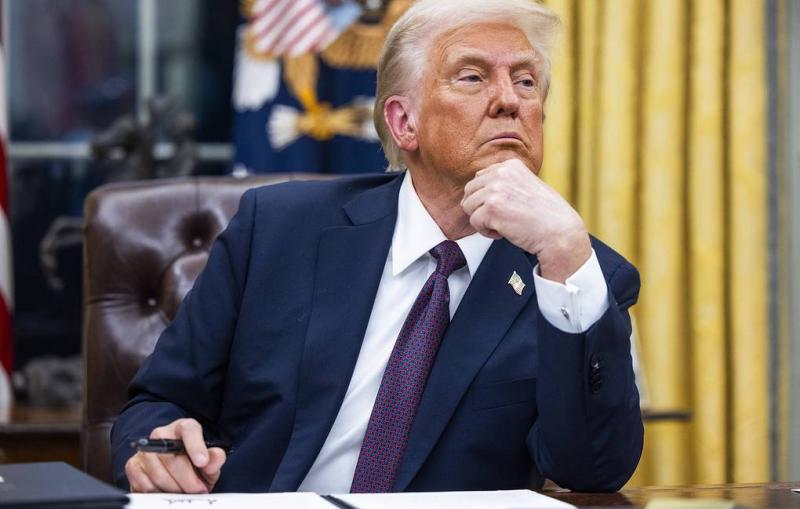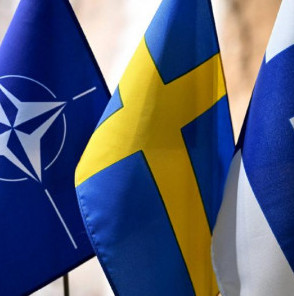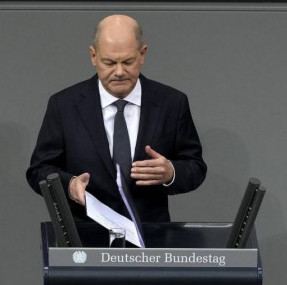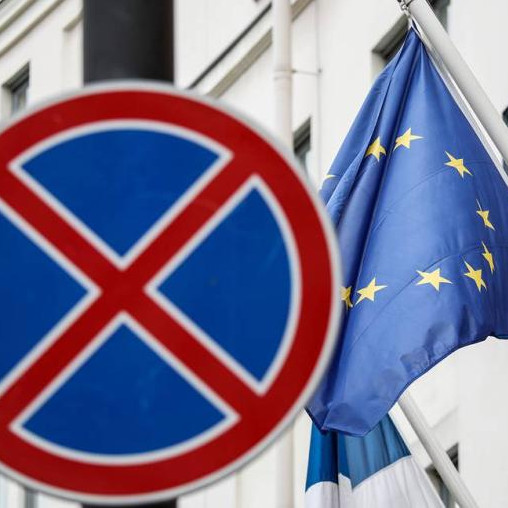
- Press review: US suspends USAID aid to Central Asia while Hamas visits Moscow again
- Press review: US urges elections in Ukraine as Trump enforces tough import tariffs
- Press review: NATO increases defense spending as Russia-Germany trade turnover falls
- Press review: Kiev may lose military aid while Trump
Donald Trump unveils his priorities as US president; Iran warns of withdrawing from the Nuclear Non-Proliferation Treaty; and Kiev is in ‘shock and awe’ after Trump’s inauguration. These stories have topped Tuesday’s newspaper headlines across Russia.
Media: Trump outlines his priorities as US president
US President Donald Trump, who assumed office on January 20, has revealed a series of significant decisions. Regarding foreign policy, he reiterated his intention to bring the Panama Canal back under US control and confirmed plans to rename the Gulf of Mexico to the Gulf of America. The US president also committed to "rebuilding the strongest military the world has ever seen." However, Trump stated he aims to be remembered in history as a peacemaker, Vedomosti observes.
The first executive orders signed by Trump are seen as a publicity stunt rather than a genuine reform, which is typical for a new administration that overturns the previous government’s decisions upon taking office, explained Viktoria Zhuravlyova, head of the Center for North American Studies at the Russian Academy of Sciences’ Institute of World Economy and International Relations. The initial results of any new administration’s activities are typically judged within its first 100 days. Trump will be able to secure his legacy only if he gains Congressional approval. Otherwise, the majority of his orders will only last four years, to be overturned by a Democrat president, a scenario similar to how Trump himself reversed decisions made by his predecessor, Joe Biden, Zhuravlyova emphasized.
The Kremlin welcomes Trump’s desire to restore contact with Moscow, but dialogue must be based on equality and mutual respect, Russian President Vladimir Putin said during a meeting with permanent members of the National Security Council on the day of the US presidential inauguration. Russia is open to discussions on the Ukraine conflict, as long as the goal is to achieve lasting peace, prioritizing the interests of all people in the region rather than seeking a temporary ceasefire, Putin warned, as reported by Izvestia.
Both Putin and Trump have expressed readiness to engage in talks. The new US president’s administration will likely develop strategies toward peace, but the next steps will hinge on Trump's willingness to consider Russia’s core interests, political scientist Dmitry Yelovsky noted. "Vladimir Putin maintains his characteristic measured rhetoric: he is open to dialogue, demonstrating respect toward the leader of another nation. Against the backdrop of the foul-mouthed Zelensky, shaky Biden, and hysterical European leaders, the Russian president presents himself as an old-school statesman—dignified and respectable. Putin and Trump share a complicated relationship history, but this may facilitate dialogue, though the prospects for restoring relations remain uncertain," the expert added.
Vedomosti: What’s behind Iran’s threat to withdraw from the Nuclear Non-Proliferation Treaty
Iranian Foreign Ministry Spokesman Esmail Baghaei has announced that if Western countries activate the snapback mechanism to restore the UN Security Council’s sanctions related to the Iran nuclear deal, Tehran will withdraw from the Nuclear Non-Proliferation Treaty (NPT), thereby freeing itself from the obligation not to possess nuclear weapons, Vedomosti writes.
In mid-January, Iranian Deputy Foreign Minister Kazem Gharibabadi told the ISNA news agency about closed-door talks on the nuclear issue, which took place in Geneva and involved the European signatories of the nuclear deal—the UK, Germany, and France. Russia did not participate in the consultations. As for the US, it exited the Joint Comprehensive Plan of Action (JCPOA) during Donald Trump’s first term, undermining the agreement, and did not rejoin under Joe Biden.
According to Vladimir Sazhin, a researcher at the Russian Academy of Sciences’ Institute of Oriental Studies, since the US is no longer a party to the JCPOA, it cannot initiate the restoration of sanctions, but France and the United Kingdom have the right to do so. "Baghaei’s statement should be regarded as propaganda, made simply to cover all bases," the expert explained.
It’s impossible to restore sanctions against Iran at the UN Security Council level because Russia and China would block such an initiative, Lev Sokolshchik, senior researcher with the Center for Comprehensive European and International Studies at the Higher School of Economics, added. However, the new Trump administration will likely ramp up pressure with national sanctions mechanisms, namely executive orders, the expert stressed. Meanwhile, Iran’s withdrawal from the NPT Treaty would significantly impact the country’s security, Sazhin noted. In this case, even Tehran’s ally Moscow, a key NPT member, would be forced to end nuclear cooperation with Iran, including the construction of new energy units at the Bushehr Nuclear Power Plant.
The Trump administration has announced that in the coming month, it will make decisions regarding Iran, whose position in the region has been weakened by Israel. Washington may very well resort to military options, Sokolshchik noted. Notably, it was Trump who initiated the killing of General Qassem Soleimani, a commander of Iran’s Islamic Revolutionary Guard Corps. The expert believes that in theory, Israel could also carry out a preemptive strike. However, in this case, Tehran would have no choice but to continue developing nuclear and missile technologies, Sokolshchik concluded.
Nezavisimaya Gazeta: Kiev in 'shock and awe' after Trump’s inauguration
Members of US President Donald Trump’s team are essentially greenlighting Ukraine’s partition and canceling its Euro-Atlantic prospects by assuming that Kiev could surrender some of its territories, former Ukrainian Deputy Foreign Minister Oleg Shamshur said in an article on Trump’s inauguration. Meanwhile, the Ukrainian military has opposed an early end to the armed conflict because ending it this year would result in a defeat for Ukraine, Nezavisimaya Gazeta notes.
Shamshur’s article was specifically in response to Western media reports stating that Trump had already instructed his aides to arrange a phone call with Russian President Vladimir Putin.
Clearly, Ukraine’s political elite is bewildered, Oleg Nemensky, leading expert at the Russian Institute for Strategic Studies, explained. Kiev officials appear to be attempting to influence Trump, at least through his aides who may have received reports on the matter. "Still, those who have reached such conclusions seek to demonstrate their allegiance to the country, just in case the situation deteriorates further. So they can later justify themselves, claiming their goal was different and that they showed resistance, but in the end, they were forced to take certain actions," Nemensky pointed out.
Meanwhile, he added, the lack of official proposals from the 47th US president on resolving the military confrontation with Russia makes it difficult to predict anything. However, one can assume that preparations are ongoing for major talks on freezing the conflict. Both Trump’s supporters and his globalist opponents are prepared to support the idea to provide a temporary reprieve to Ukraine and Europe, allowing them to prepare for a potential all-out European war.
"However, it’s unclear why members of Trump’s team are proposing peace plans that initially disregard Moscow’s well-defined interests, as well as the reasons for the conflict that Russia has long clarified. It’s difficult to understand the rationale. Perhaps, this is a public relations stunt or stems from the complete inability of some US politicians to grasp the seriousness of the ongoing processes," the expert suggested.
Izvestia: Slovakia seeks Turkey’s help in resolving issue of Russian gas imports
Turkish President Recep Tayyip Erdogan and Slovak Prime Minister Robert Fico have signed an agreement on strategic cooperation. They also discussed the Ukraine issue and gas transit through the TurkStream pipeline. Experts interviewed by Izvestia point out that Slovakia aims to strengthen its sovereignty within Europe, particularly to reinforce its positions in terms of exerting pressure on Kiev.
It’s quite logical for Slovakia to expand cooperation with Turkey, Vladimir Avatkov, head of the Department of the Middle and Post-Soviet East at the Institute of Scientific Information on Social Sciences of the Russian Academy of Sciences, noted. "For Slovakia, as well as for other Eastern and Southeast European nations, it’s crucial to forge partnerships with neighboring countries that aren’t European Union members, like Turkey. Ankara has gas it purchases from Russia, in particular. Bratislava’s decision to strengthen ties with Ankara enhances Slovakia’s energy security amid a decline in gas supplies via Ukraine," the analyst explained.
The parties might very well have discussed pressuring Ukraine during the Ankara meeting, said Igor Yushkov, leading analyst with the National Energy Security Fund and expert at the Financial University under the Government of the Russian Federation. "Slovakia has so far done little to exert influence on Ukraine. Although the country remains one of the main electricity suppliers to Ukraine and the Slovaks have threatened to cut off these supplies, they still haven’t dared to act. It appears they are hesitant to pressure Ukraine on their own and are looking to form a sort of coalition. This is why they are holding talks with all relevant parties, and Ankara is a key player," he added.
Meanwhile, in Yushkov’s opinion, the TurkStream has a limited ability to compensate for the lost gas volumes. The gas pipeline already exceeded its design capacity in 2024. In theory, two billion cubic meters of gas intended for Turkey could be rerouted from the TurkStream to the Blue Stream pipeline. This would allow the use of the released capacity of the TurkStream to transit Russian gas to Europe. Still, the amount of gas will not exceed two billion cubic meters, meaning EU countries will need to source the rest of the gas they require from elsewhere.
Izvestia: Donald and Melania Trump’s meme coins impact crypto market
The meme coins that Donald and Melania Trump launched over the weekend have gained popularity. The hype is fueled by the new US president’s personality, as well as on his commitment to make cryptocurrency a national priority. However, it was mostly early buyers and speculators that were able to profit from the coins, said experts interviewed by Izvestia.
All meme coins are designed to have a short-term effect, Shard director of analytics Fyodor Ivanov stressed. Their value is linked to a meme, that is, an event, a character, or a person. The two tokens’ launch was coincided with the inauguration of Trump, who promised to become the first crypto president of the United States. "The price of such coins usually rises rapidly and then drops sharply. It’s a different matter if you buy them when the hype is growing; this is when you may be able to profit," Ivanov said.
Trump has well-developed promotional strategies and his presence in the media is strengthened by his owning of shares in various media ventures, Denis Astafyev, founder of the SharesPro investment company, highlighted. This is what makes it possible to monetize any initiative related to Trump; and this is the reason why Trump’s token caused a lot of excitement on the market.
It’s early traders and opportunists that were able to capitalize on these coins, said Venera Shaidullina, associate professor with the Global Financial Markets and FinTech Department at the Plekhanov Russian University of Economics. In one case, a trader earned $185 million after investing $1 million.
"Meme tokens are subject to high volatility and are created solely for speculative purposes. Such assets should not be seen as a long-term investment. There is a great risk that if prices plunge, Trump will distance himself from the project, explaining that the tokens were designed solely as collectibles," BitRiver financial analyst Vladislav Antonov emphasized.
The launch of meme coins affects the crypto market, sparking additional waves of speculation and increasing volatility, Neomarkets chief analyst Oleg Kalmanovich pointed out. Part of the market capital may be temporarily moved from well-known coins to new meme projects, boosting their growth. However, the hype does not usually last long and investments return to the blockchains backed by real technologies, the expert concluded.
TASS is not responsible for the material quoted in these press reviews









